Unit 3 Could you please tell me where the restrooms are? Section B 2a-2d课件(共27张PPT) 人教版英语九年级全册
文档属性
| 名称 | Unit 3 Could you please tell me where the restrooms are? Section B 2a-2d课件(共27张PPT) 人教版英语九年级全册 | 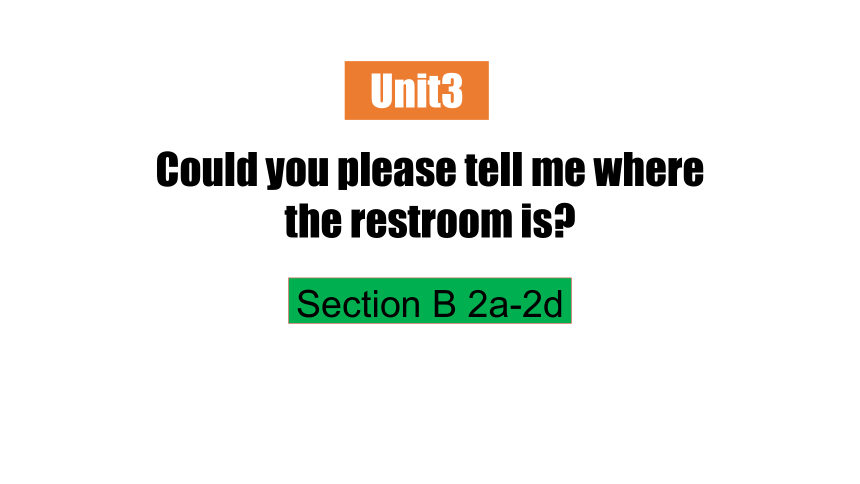 | |
| 格式 | pptx | ||
| 文件大小 | 7.2MB | ||
| 资源类型 | 教案 | ||
| 版本资源 | 人教新目标(Go for it)版 | ||
| 科目 | 英语 | ||
| 更新时间 | 2024-09-14 07:28:15 | ||
图片预览

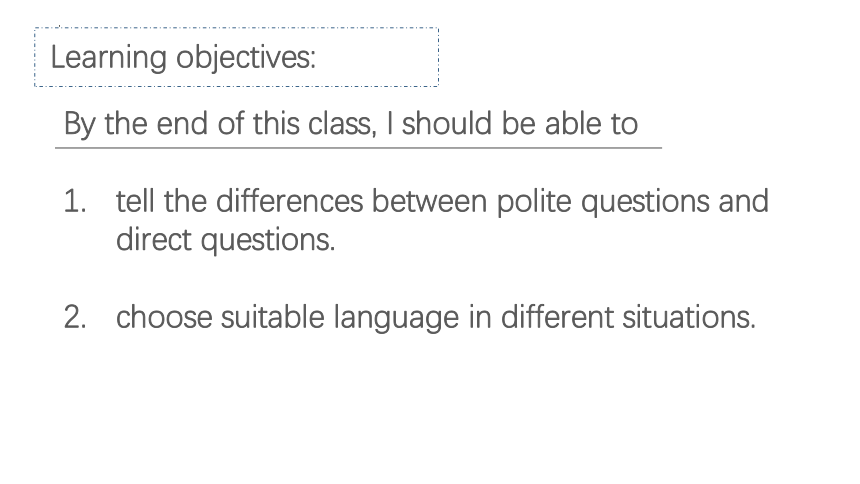
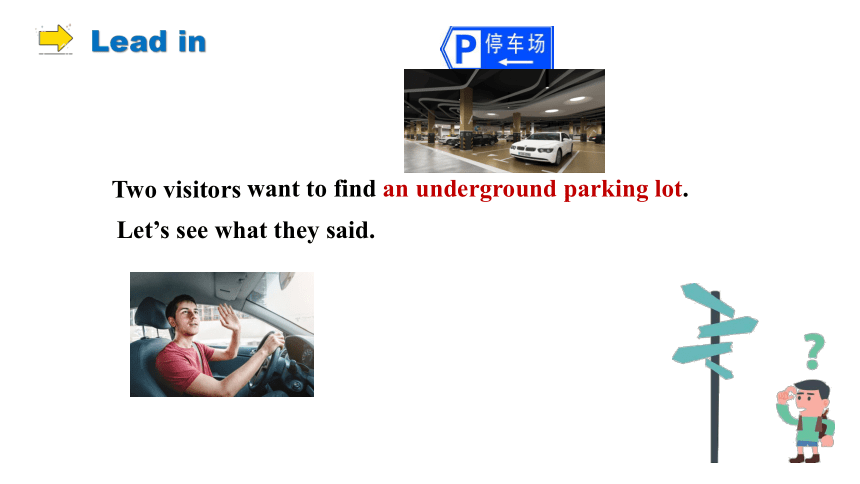
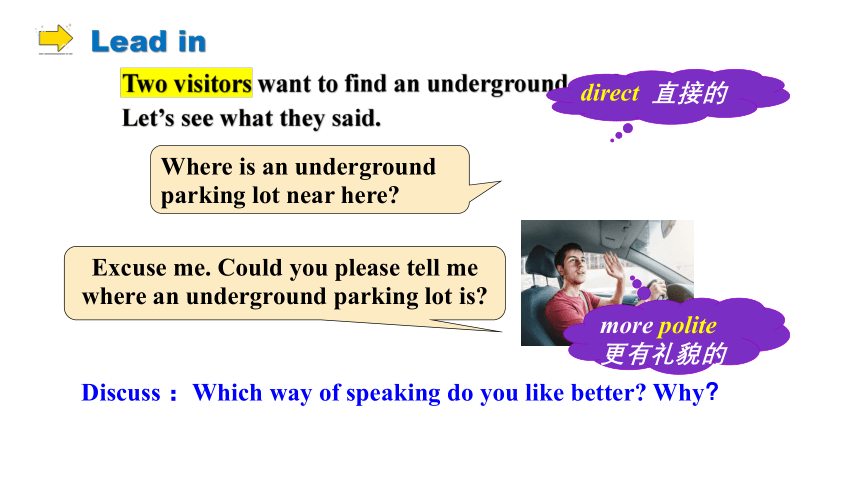
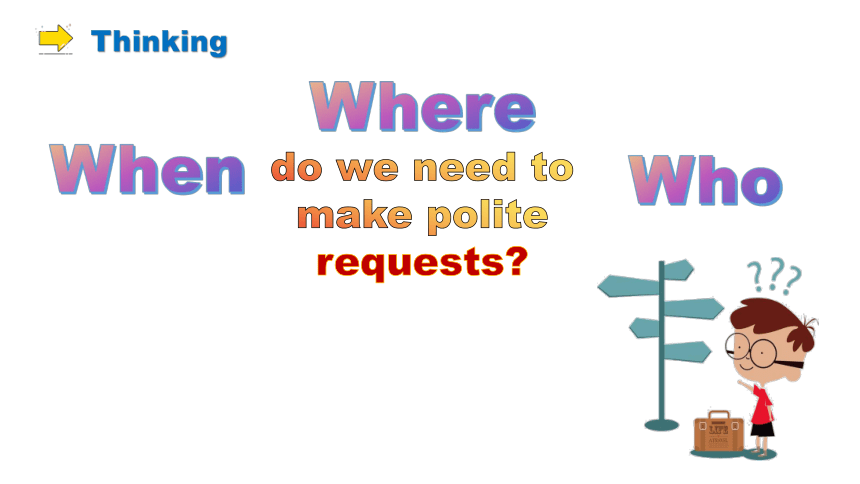
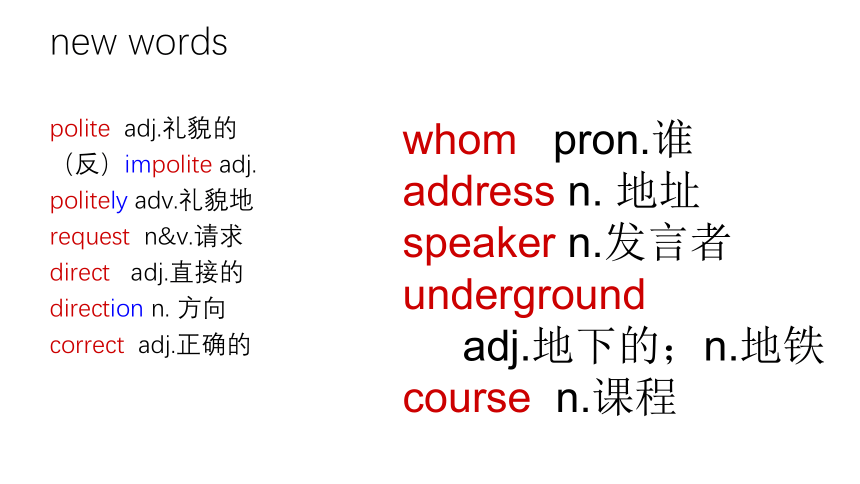
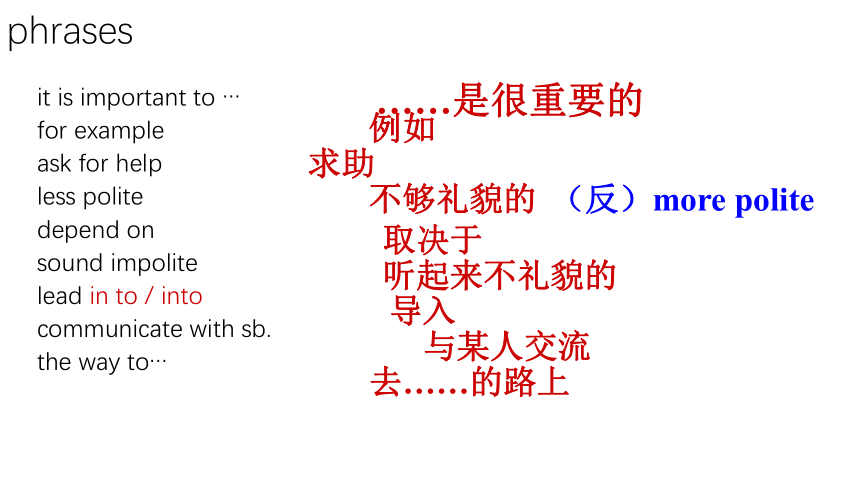
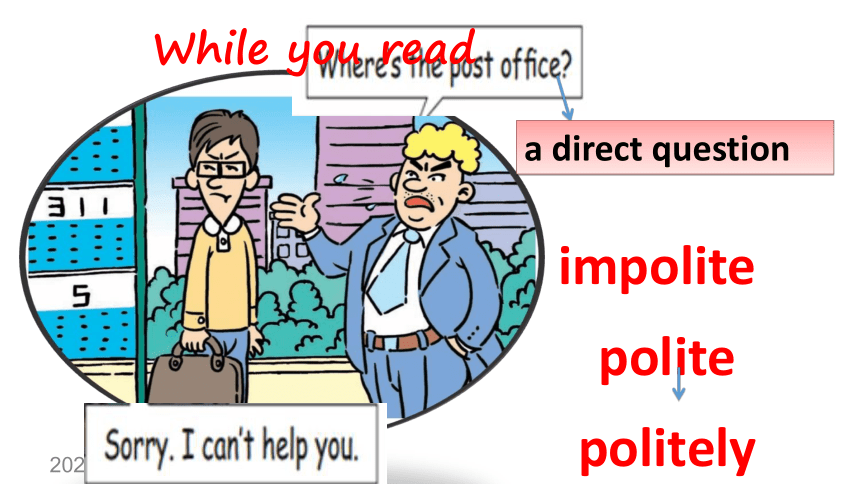
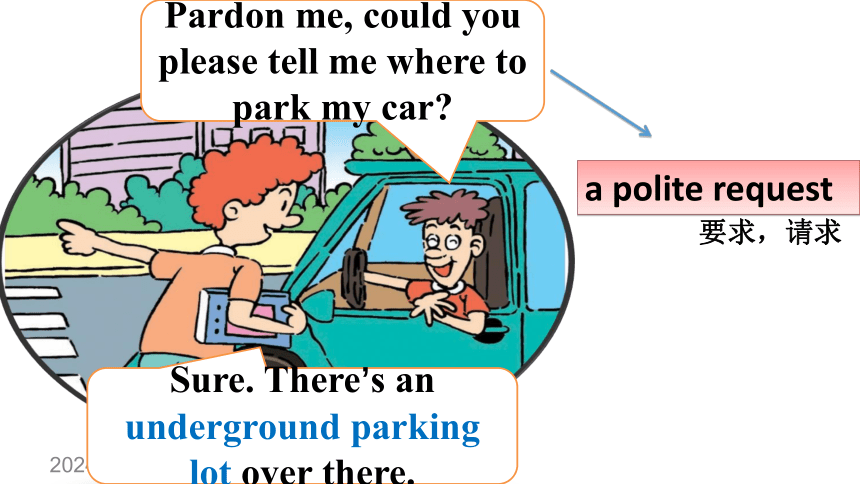
文档简介
(共27张PPT)
Unit3
Could you please tell me where the restroom is
Section B 2a-2d
Learning objectives:
By the end of this class, I should be able to
tell the differences between polite questions and direct questions.
choose suitable language in different situations.
want to find an underground parking lot.
Lead in
Two visitors
Let’s see what they said.
Where is an underground parking lot near here
Discuss :Which way of speaking do you like better Why?
Excuse me. Could you please tell me where an underground parking lot is
more polite
更有礼貌的
Two visitors want to find an underground parking lot.
Let’s see what they said.
Lead in
direct 直接的
Where
do we need to make polite requests
When
Who
Thinking
new words
polite adj.礼貌的
(反)impolite adj.
politely adv.礼貌地
request n&v.请求
direct adj.直接的
direction n. 方向
correct adj.正确的
whom pron.谁
address n. 地址
speaker n.发言者
underground
adj.地下的;n.地铁
course n.课程
phrases
it is important to …
for example
ask for help
less polite
depend on
sound impolite
lead in to / into
communicate with sb.
the way to…
……是很重要的
例如
求助
不够礼貌的
(反)more polite
取决于
听起来不礼貌的
导入
与某人交流
去……的路上
2024/9/14
impolite
a direct question
polite
politely
While you read
2024/9/14
Sure. There’s an underground parking lot over there.
Pardon me, could you please tell me where to park my car
a polite request
要求,请求
2a
Where do you need to make polite requests Think of some possible situations. Discuss them with your partner.
提出礼貌的请求
1. In a foreign country.
2. In public places like a bank, a post office, a library…
3. At school (especially when speaking to your teachers).
4. At home (especially when speaking to your elders).
Pre-reading
Underline
the topic sentence of each paragraph.
When you visit a foreign country, it is important to know how to ask for help politely.
Good speakers change the way they speak in different situations.
Usually polite questions are longer.
It is important to learn how to use the right language in different situations.
Topic
Good speakers change the way they speak in different situations.
Usually polite questions are longer.
Conclusion
Tip:
The topic sentence is usually the first or the second sentence
of each paragraph. Sometimes it is also in the middle of the paragraph.
Opinions +
examples
Fast reading
Read Para1 carefully, and answer the questions.
B. Could you please tell me where the restrooms are
A. Where are the restrooms
Q1: When you visit a foreign country, you have to ask for help, which request is better
Q2: Are the
two requests
correct
The two questions are
________ requests
for directions.
similar
Q3: Why is
the request B
better ?
Careful reading
Read Para1 carefully, and answer the questions.
B. Could you please tell me where the restrooms are
A. Where are the restroom
The two questions are
________ requests
for directions.
similar
Because the request A is a very _______ question.
It is __________ to just ask a question correctly.
We also need to learn _______________ when we
ask for help.
direct
not enough
how to be polite
A: 有礼貌
B: 直接的
C: 正确的
Good speakers change the way they speak in different situations. …
n. 发言者
Usually polite questions are longer. They include expressions such as “Could you please … ” or “May I ask … ” It sounds more polite to say, “Peter, could you please tell me your e-mail address ”…
n. 地址
Paragraph 2
Paragraph 3
在不同情况下
HOw
Read Para2 carefully, and answer the questions.
How
do
good
learners
change
the way
they speak
in
different
situations
depends on
how well they know each other
whom they are speaking to
However, it is important to learn how to use the right language in different situations. …
Paragraph 4
语言
Direct questions Polite requests
Where are the restrooms
Find the direct questions and polite requests from the passage.
2c
P23
When is the school trip
Where’s the post office
Could you please tell me where the restrooms are
Excuse me, Mr. West. Do you know when the school trip is
Peter, could you please tell me your e-mail address
Which is more polite
Pardon me, could you please tell me where to park my car
Request Person Place
1. Will you pass the salt
2. Do you know where I can change some money, please
3. Could you tell me what just happened
4. Can you please tell me where the nearest station is
5. Excuse me, do you know what time it begins, please
6. Let me know when you’re ready, OK
7. Could you possibly tell me the way to the village school
A
restaurant/ home
B
street
A/B
any public place/home
B
B
B
A
movie theater /concert hall
street
home
street
Read the requests below. In the second column, write A if you would say it to someone you know and B if you would say it to a stranger. In the last column, write where you think these people are.
2d
P23
When you visit a foreign country, it is important to know how to ask for help politely.
polite adj. 意为“有礼貌的;客气的”,be polite to sb. 意为
“对某人有礼貌”
politely adv. 意为“有礼貌地;客气地”
impolite adj. 意为“不礼貌的;不客气的”
impolitely adv. 意为“无礼地”
e.g. Please be polite to your guests.
Language points
Post-reading
Post-reading
2. These are similar requests for directions.
request v./n. 意为“要求,请求”
常见短语:
(1) request sth. from sb. 意为“(向某人)请求某物/某事”
(2) request sb.to do sth. 意为“请求某人做某事”
(3) request + that 从句(从句用虚拟语气:should + 动词原形,should
可以省略)
e.g. The man requested some hot water from me.
3. Both are correct, but the first one sounds less polite.
(1) less 后面加上多音节形容词是比较级,与more的意思相反。
有时可以和“not as/so+ adj./adv.+ as”进行互换。
less polite 意为“不如……礼貌”。
e.g. That city is less fascinating than ours.
=That city is not as/so fascinating than ours.
(2) sound 是系动词,意为“听起来……”。
e.g. Don’t think that English is less important now.
Post-reading
4. The expressions they use might depend on whom they are speaking
to or how well they know each other.
(1) 此句为复合句,they use 是省略了关系代词that或which的定语从句,
修饰先行词the expressions; whom they speaking to和how well they know
each other是宾语从句,作介词on的宾语。
(2) depend on 意为“取决于;依赖于”,on为介词,可以换成upon,
后接名词、代词、动名词或接宾语从句。
e.g. You can depend on him to make a right choice.
Post-reading
一、根据首字母或汉语提示完成单词或用所给单词的适当形式填空
1. It is ________(礼貌的) to offer seats to the old on the bus.
2. There is an ____________(地下的) supermarket in our neighborhood.
3. I didn’t write to you, because I couldn’t remember your a________.
4. I’m a stranger here and I don’t know the d________ to the old temple.
5. I wonder if I was reading the poem _________. (correct)
6. ________(who) did you give the book to
polite
Exercises
underground
ddress
irection
correctly
Whom
根据句意,用所给单词的适当形式填空。
1. The teacher told him __________(do) his homework carefully.
2. It's convenient for us __________(take) the subway.
3. The street in the morning is __________(crowd). We go through the street easily.
4. More and more people like to buy books on the Internet as the books on the Internet are ____________(expensive).
5. He met many strange people and learned lots of _________ (interest) things during the vacation.
6.Can you tell me where there’s a good place _______ (go) sightseeing
to do
to take
uncrowded
inexpensived
interesting
to go
根据汉语意思完成下列句子。
1、打扰了,你能告诉我去电影院的路么?
Pardon me, could you please show me
____ ____ _____ the cinema
2、我去过许多城市,比如北京、上海、广州。
I have been to many cities, ____ _____ Beijing, Shanghai and Guangzhou.
the way to
for example
Summary
Key words and phrases:
polite, direction, request, correct, politely, direct, speaker, whom, impolitely, address, underground, depend on, ask for help politely…
Key sentences:
Will you pass the salt
Dou you know where I can change some money, please
Could you tell me what just happened
Can you please tell me where the nearest station is
Excuse me, do you know what time it begins, please
Let me know when you’re ready, OK
Could you possibly tell me the way to the village school
3. 说话有礼貌会帮你和别人更好地交流。
Speaking politely can help you ________ better _______others.
4. 我们不能永远依靠父母。
We can't _____ ____ our parents forever.
5.我们用一些额外语言导入一些请求。
We use some extra language to ____
___ _____ a request.
communicate
with
depend on
lead
in to
Unit3
Could you please tell me where the restroom is
Section B 2a-2d
Learning objectives:
By the end of this class, I should be able to
tell the differences between polite questions and direct questions.
choose suitable language in different situations.
want to find an underground parking lot.
Lead in
Two visitors
Let’s see what they said.
Where is an underground parking lot near here
Discuss :Which way of speaking do you like better Why?
Excuse me. Could you please tell me where an underground parking lot is
more polite
更有礼貌的
Two visitors want to find an underground parking lot.
Let’s see what they said.
Lead in
direct 直接的
Where
do we need to make polite requests
When
Who
Thinking
new words
polite adj.礼貌的
(反)impolite adj.
politely adv.礼貌地
request n&v.请求
direct adj.直接的
direction n. 方向
correct adj.正确的
whom pron.谁
address n. 地址
speaker n.发言者
underground
adj.地下的;n.地铁
course n.课程
phrases
it is important to …
for example
ask for help
less polite
depend on
sound impolite
lead in to / into
communicate with sb.
the way to…
……是很重要的
例如
求助
不够礼貌的
(反)more polite
取决于
听起来不礼貌的
导入
与某人交流
去……的路上
2024/9/14
impolite
a direct question
polite
politely
While you read
2024/9/14
Sure. There’s an underground parking lot over there.
Pardon me, could you please tell me where to park my car
a polite request
要求,请求
2a
Where do you need to make polite requests Think of some possible situations. Discuss them with your partner.
提出礼貌的请求
1. In a foreign country.
2. In public places like a bank, a post office, a library…
3. At school (especially when speaking to your teachers).
4. At home (especially when speaking to your elders).
Pre-reading
Underline
the topic sentence of each paragraph.
When you visit a foreign country, it is important to know how to ask for help politely.
Good speakers change the way they speak in different situations.
Usually polite questions are longer.
It is important to learn how to use the right language in different situations.
Topic
Good speakers change the way they speak in different situations.
Usually polite questions are longer.
Conclusion
Tip:
The topic sentence is usually the first or the second sentence
of each paragraph. Sometimes it is also in the middle of the paragraph.
Opinions +
examples
Fast reading
Read Para1 carefully, and answer the questions.
B. Could you please tell me where the restrooms are
A. Where are the restrooms
Q1: When you visit a foreign country, you have to ask for help, which request is better
Q2: Are the
two requests
correct
The two questions are
________ requests
for directions.
similar
Q3: Why is
the request B
better ?
Careful reading
Read Para1 carefully, and answer the questions.
B. Could you please tell me where the restrooms are
A. Where are the restroom
The two questions are
________ requests
for directions.
similar
Because the request A is a very _______ question.
It is __________ to just ask a question correctly.
We also need to learn _______________ when we
ask for help.
direct
not enough
how to be polite
A: 有礼貌
B: 直接的
C: 正确的
Good speakers change the way they speak in different situations. …
n. 发言者
Usually polite questions are longer. They include expressions such as “Could you please … ” or “May I ask … ” It sounds more polite to say, “Peter, could you please tell me your e-mail address ”…
n. 地址
Paragraph 2
Paragraph 3
在不同情况下
HOw
Read Para2 carefully, and answer the questions.
How
do
good
learners
change
the way
they speak
in
different
situations
depends on
how well they know each other
whom they are speaking to
However, it is important to learn how to use the right language in different situations. …
Paragraph 4
语言
Direct questions Polite requests
Where are the restrooms
Find the direct questions and polite requests from the passage.
2c
P23
When is the school trip
Where’s the post office
Could you please tell me where the restrooms are
Excuse me, Mr. West. Do you know when the school trip is
Peter, could you please tell me your e-mail address
Which is more polite
Pardon me, could you please tell me where to park my car
Request Person Place
1. Will you pass the salt
2. Do you know where I can change some money, please
3. Could you tell me what just happened
4. Can you please tell me where the nearest station is
5. Excuse me, do you know what time it begins, please
6. Let me know when you’re ready, OK
7. Could you possibly tell me the way to the village school
A
restaurant/ home
B
street
A/B
any public place/home
B
B
B
A
movie theater /concert hall
street
home
street
Read the requests below. In the second column, write A if you would say it to someone you know and B if you would say it to a stranger. In the last column, write where you think these people are.
2d
P23
When you visit a foreign country, it is important to know how to ask for help politely.
polite adj. 意为“有礼貌的;客气的”,be polite to sb. 意为
“对某人有礼貌”
politely adv. 意为“有礼貌地;客气地”
impolite adj. 意为“不礼貌的;不客气的”
impolitely adv. 意为“无礼地”
e.g. Please be polite to your guests.
Language points
Post-reading
Post-reading
2. These are similar requests for directions.
request v./n. 意为“要求,请求”
常见短语:
(1) request sth. from sb. 意为“(向某人)请求某物/某事”
(2) request sb.to do sth. 意为“请求某人做某事”
(3) request + that 从句(从句用虚拟语气:should + 动词原形,should
可以省略)
e.g. The man requested some hot water from me.
3. Both are correct, but the first one sounds less polite.
(1) less 后面加上多音节形容词是比较级,与more的意思相反。
有时可以和“not as/so+ adj./adv.+ as”进行互换。
less polite 意为“不如……礼貌”。
e.g. That city is less fascinating than ours.
=That city is not as/so fascinating than ours.
(2) sound 是系动词,意为“听起来……”。
e.g. Don’t think that English is less important now.
Post-reading
4. The expressions they use might depend on whom they are speaking
to or how well they know each other.
(1) 此句为复合句,they use 是省略了关系代词that或which的定语从句,
修饰先行词the expressions; whom they speaking to和how well they know
each other是宾语从句,作介词on的宾语。
(2) depend on 意为“取决于;依赖于”,on为介词,可以换成upon,
后接名词、代词、动名词或接宾语从句。
e.g. You can depend on him to make a right choice.
Post-reading
一、根据首字母或汉语提示完成单词或用所给单词的适当形式填空
1. It is ________(礼貌的) to offer seats to the old on the bus.
2. There is an ____________(地下的) supermarket in our neighborhood.
3. I didn’t write to you, because I couldn’t remember your a________.
4. I’m a stranger here and I don’t know the d________ to the old temple.
5. I wonder if I was reading the poem _________. (correct)
6. ________(who) did you give the book to
polite
Exercises
underground
ddress
irection
correctly
Whom
根据句意,用所给单词的适当形式填空。
1. The teacher told him __________(do) his homework carefully.
2. It's convenient for us __________(take) the subway.
3. The street in the morning is __________(crowd). We go through the street easily.
4. More and more people like to buy books on the Internet as the books on the Internet are ____________(expensive).
5. He met many strange people and learned lots of _________ (interest) things during the vacation.
6.Can you tell me where there’s a good place _______ (go) sightseeing
to do
to take
uncrowded
inexpensived
interesting
to go
根据汉语意思完成下列句子。
1、打扰了,你能告诉我去电影院的路么?
Pardon me, could you please show me
____ ____ _____ the cinema
2、我去过许多城市,比如北京、上海、广州。
I have been to many cities, ____ _____ Beijing, Shanghai and Guangzhou.
the way to
for example
Summary
Key words and phrases:
polite, direction, request, correct, politely, direct, speaker, whom, impolitely, address, underground, depend on, ask for help politely…
Key sentences:
Will you pass the salt
Dou you know where I can change some money, please
Could you tell me what just happened
Can you please tell me where the nearest station is
Excuse me, do you know what time it begins, please
Let me know when you’re ready, OK
Could you possibly tell me the way to the village school
3. 说话有礼貌会帮你和别人更好地交流。
Speaking politely can help you ________ better _______others.
4. 我们不能永远依靠父母。
We can't _____ ____ our parents forever.
5.我们用一些额外语言导入一些请求。
We use some extra language to ____
___ _____ a request.
communicate
with
depend on
lead
in to
同课章节目录
- Unit 1 How can we become good learners.
- Section A
- Section B
- Unit 2 I think that mooncakes are delicious!
- Section A
- Section B
- Unit 3 Could you please tell me where the restroom
- Section A
- Section B
- Unit 4 I used to be afraid of the dark.
- Section A
- Section B
- Unit 5 What are the shirts made of?
- Section A
- Section B
- Review of Units 1-5
- Unit 6 When was it invented?
- Section A
- Section B
- Unit 7 Teenagers should be allowed to choose their
- Section A
- Section B
- Unit 8 It must belong to Carla.
- Section A
- Section B
- Unit 9 I like music that I can dance to.
- Section A
- Section B
- Unit 10 You're supposed to shake hands.
- Section A
- Section B
- Review of Units 6-10
- Unit 11 Sad movies make me cry.
- Section A
- Section B
- Unit 12 Life is full of the unexpected
- Section A
- Section B
- Unit 13 We're trying to save the earth!
- Section A
- Section B
- Unit 14 I remember meeting all of you in Grade 7.
- Section A
- Section B
- Review of Units 11-14
